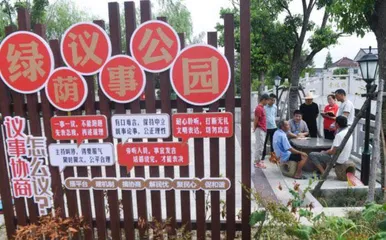The Whole-Process People’s Democracy Opens Up New Realm of Human Political Civilization
作者: Yu Hongjun

Socialism with Chinese characteristics is a great cause full of vigor and vitality. The democratic politics with Chinese characteristics is a development process of constant exploration and innovation, both in theory and in practice. Since the 18th National Congress of the Communist Party of China (CPC), the building of Socialism with Chinese characteristics has ushered in a new era. General Secretary Xi Jinping has vigorously advocated and promoted the building of the whole-process people’s democracy, which has made remarkable achievements in terms of theoretical exploration and institutional innovation, greatly enriched the Marxist theories on democratic politics and the political and democratic practice of Socialism with Chinese characteristics. This new format of democracy has opened up a new realm of human political civilization and attracted considerable attention from the international community.
China’s Revolution and Socialist Construction are the Democratic Cause of the Chinese People
Socialism and democracy are not only two political concepts that differ yet closely relate, but also complementary social practices and mutually-propelling institutional arrangements. When Proletarian revolutionary instructors Karl Marx, Frederick Engels and Vladimir Lenin used and scientifically interpreted the classic concept of socialism, they often related socialism with democracy. The majority of the working-class political parties founded at the initial stage of the international communist movement were called Social Democratic Party and Social Democratic Workers’ Party. While these revolutionary parties strove for the ideal of achieving socialism, they also fought for the democratic rights of themselves and their societies.
Lenin led the founding of the Bolshevik Party, a new working-class political party that was initially called the Russian Social Democratic Workers’ Party (Bolshevik). In 1895, Lenin wrote the Draft and Explanation of the Program of the Social-Democratic Party, which elaborated in details the nature, purpose and goals of the Party’s striving for socialism, and put forward a series of very specific requirements for democracy, such as “the convening of a Zemsky Sobor made up of representatives of all citizens so as to draw up a constitution,” “universal and direct suffrage for all citizens” and “complete equality of all citizens before the law”.
After the October Revolution triumphed in 1917, the primary task of the ruling Bolshevik Party was to build a democratic regime of workers and peasants. In his report on the Party Program delivered in 1919, Lenin stated for the first time that “account must be taken of the stage” reached by the given nation on its way towards democracy when conducting national building and social governance. When elaborating on the democracy of a regime of workers and peasants and its features, Lenin sharply analyzed that “the Soviet power had in principle provided an immensely higher proletarian democracy, creating a model of such democracy for the whole world”, but “lack of culture was reducing the significance of Soviet power and reviving bureaucracy”. Therefore, to deliver the true Soviet democracy, “a vast amount of educational, organizational and cultural work was required”. Regrettably, Lenin’s thought, believing socialist democratic politics had to be in line with the all-round social development if it was to be truly delivered, failed to be fully implemented. This stands as one of the principal reasons behind the crisis of Soviet-style socialist democracy and the ultimate disintegration of the Soviet Union.
In 1911, China abolished the feudal monarchy and became a republic. The lofty aspiration for “Democracy” and “Science” became the mainstream mindset and fundamental demands of the Chinese nation. The CPC, inspired by the May Fourth spirit of patriotism, progress, democracy and science and born in 1921, introduced Marxist theories and Russian socialist revolutionary experience into China and started the “unremitting efforts to unite and lead Chinese people of all ethnic groups to strive for national independence, liberation, prosperity and people’s well-being. The Second CPC National Congress held in 1922 clearly adopted the slogan of unifying China as a “true democratic republic” and unprecedentedly put forward an explicit program of democratic revolution.
The New Democratic Revolution led by the CPC is essentially to overthrow the rule of imperialism, feudalism and bureaucratic capitalism in China and establish a people’s democratic regime. In 1945, Mao Zedong introduced the new concept of “the democratic cause of the Chinese people” in his article titled The Current International Situation and the Basic Principles of the CPC’s Foreign Policies. He emphasized that China’s revolution aimed to “build a new democratic state politically, economically and culturally” and that the revolutionary forces represented by the CPC were the “people’s democratic forces”.
In June, 1949 when China’s Revolution was to sweep to victory, Mao Zedong wrote a masterpiece titled On People’s Democratic Dictatorship, in which he expounded on the CPC’s nation-building approach as it would soon become the ruling party and highlighted the historic significance of the democratic nature of the new regime. He pointed out: “The national system of people’s democratic dictatorship was a powerful weapon to safeguard the outcomes of the people’s revolution and thwart the plots of domestic and foreign enemies for restoration.”
This period coincided with the end of the Second World War. A number of socialist countries were born on the Eurasian continent. Many of them directly adopt the word “democracy” in the names of their countries, such as “German Democratic Republic” and “People’s Democratic Republic of Korea”. Mao Zedong hailed them as “the world’s democratic forces for the people” and firmly believed that “adhering to the people’s democratic dictatorship and standing in solidarity with international friends would make our nation-building achieve rapid success”.